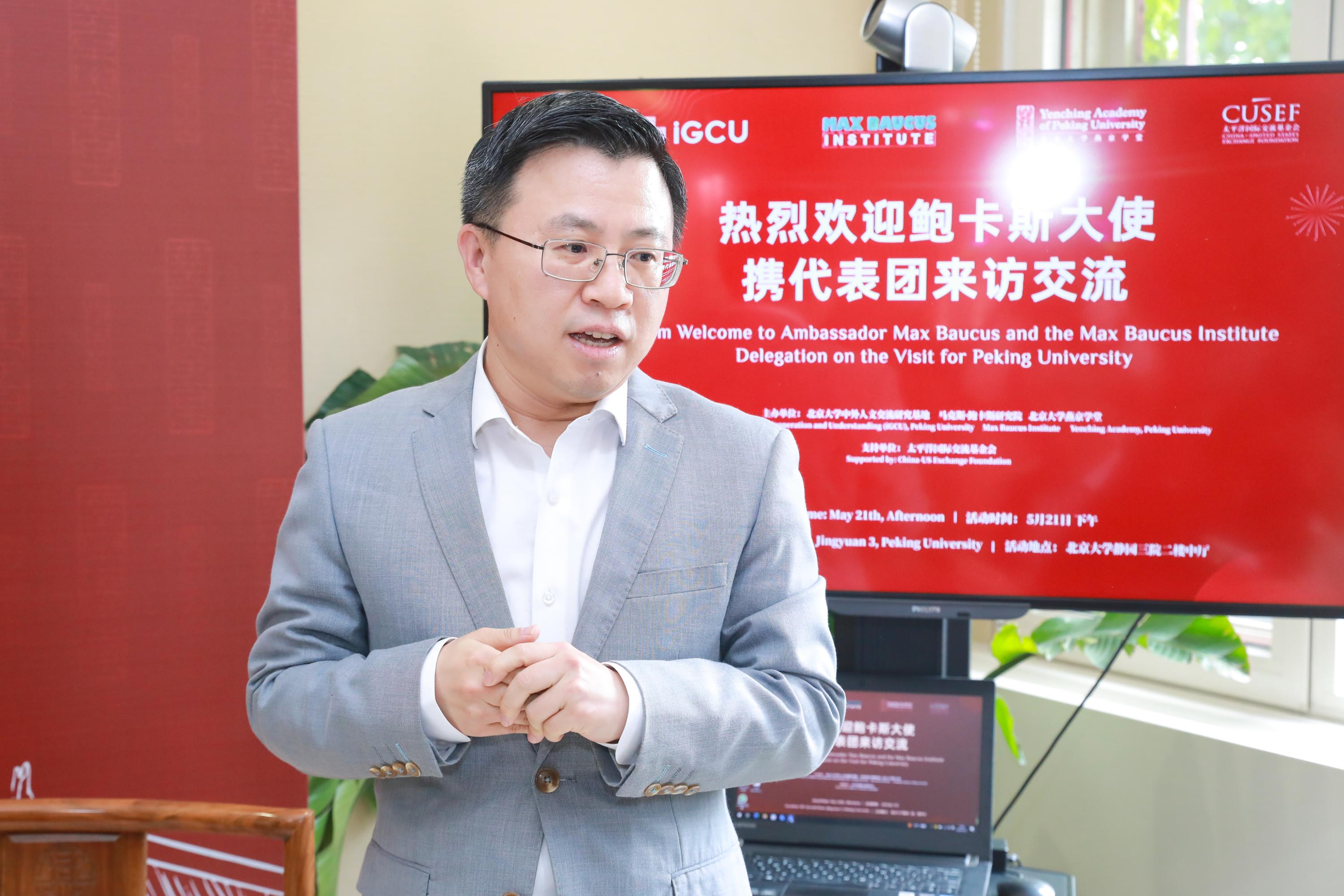On May 21, 2025, Yenching Academy welcomed a delegation from the Max Baucus Institute, led by former U.S. Ambassador to China, Mr. Max Baucus, accompanied by his spouse, Melodee Hanes. The delegation comprised students from the University of Montana, Montana State University, and Montana Tech, with sponsorship from the China-United States Exchange Foundation.
The session opened with warm remarks from Professor Wang Dong, a leading scholar of Sino-American relations, who welcomed the visiting delegation. He recalled Ambassador Baucus’s previous visit to PKU, noting how the dialogue between the United States and China has continued to evolve since that time. Emphasizing the lasting importance of people-to-people diplomacy, Professor Wang introduced the distinguished guests and set the tone for an afternoon of candid and constructive exchange.

Following this, Professor Dong Qiang, Dean of Yenching Academy, shared his reflections on the significance of the visit. He spoke to the mission of the Max Baucus Institute and expressed heartfelt appreciation for Ambassador Baucus’s ongoing commitment to strengthening bilateral ties. “Ambassador Baucus,” he remarked, “your dedication to people-to-people diplomacy is truly inspiring. We are deeply grateful for your efforts in advancing positive relations between the United States and China. To our young American guests, may this visit mark the beginning of lifelong connections with China.”

The opening segment continued with a keynote address from Professor Jia Qingguo, Director of the Institute for Global Cooperation and Understanding at Peking University. Reflecting on current tensions, Professor Jia outlined three main points:
The state of bilateral relations is strained, with mutual perceptions increasingly defined by “strategic competition”—a term China firmly rejects.
Despite ideological and systemic differences, China and the U.S. share more values and objectives than commonly assumed—such as a commitment to development, education, and public welfare.
Youth engagement is crucial. Professor Jia reiterated his proposal to expand educational exchange programs, highlighting how direct exposure helps build empathy and dismantle misconceptions. “The future,” he remarked, “is in the hands of young people who take the time to understand one another.”

Ambassador Baucus, in his address, built on these themes. He reflected candidly on his diplomatic tenure, noting that effective engagement requires humility, respect, and mutual understanding, not superiority or assimilation. He argued for an approach rooted in equality—one that recognizes the two countries as distinct but interdependent powers.
Drawing on his diplomatic experience, Ambassador Baucus noted that many American officials involved in shaping China policy have had limited direct exposure to the country. This lack of firsthand understanding, he suggested, can make it more difficult to develop balanced and informed approaches. Emphasizing the importance of engagement, he encouraged both nations to view each other as partners navigating a complex and increasingly multipolar world—one in which China’s technological and economic development is playing an increasingly influential role.

He explained this dynamic through a compelling metaphor: an arranged marriage—two countries brought together by geopolitical necessity. While China and the U.S. may not have “chosen” each other, he stressed that they must learn to make the relationship work. “Not all arranged marriages fail,” he remarked. “If both sides commit to mutual respect and dialogue, some of them even thrive.”

The session transitioned into a moderated conversation between Ambassador Baucus and Professor Jia, facilitated by Professor Brent Haas, Assistant Dean at Yenching Academy. This dialogue was further enriched by questions from students, creating an open and intellectually engaging exchange. Together, the speakers and participants explored continuities and changes in U.S.–China relations, while critically unpacking the assumptions that often shape diplomatic narratives.

One of the central themes addressed was the widespread use of the term “strategic competition.” Rather than rejecting competition outright, both Ambassador Baucus and Professor Jia emphasized the importance of clarifying what kind of competition should be encouraged. They drew a sharp contrast between malicious, zero-sum forms of rivalry (those that seek to undermine the other) and constructive or benign competition that pushes both nations toward greater achievement. Professor Jia likened the latter to Olympic-style sportsmanship, where striving for excellence elevates everyone involved. Climate change, education, and healthcare were cited as areas in which such positive competition could benefit not just the two countries, but global society as a whole.
Responding to student questions about cultural and political values, the speakers explored a deeper philosophical divide concerning rights and responsibilities. Professor Jia explained that China has historically placed greater emphasis on collective wellbeing, with the view that individual rights are best safeguarded within a harmonious and stable society. In contrast, Ambassador Baucus discussed how the American political tradition elevates individual liberties, sometimes even at the expense of broader social cohesion. Rather than presenting these perspectives as incompatible, the two speakers treated them as reflections of distinct civilizational paths, each with enduring value and inherent limitations.


Another set of questions turned attention to the role of public opinion and international institutions within the current world order. Ambassador Baucus expressed concern over the lack of familiarity many American policymakers have with China, noting how domestic politics often simplify or distort foreign policy discussions. He candidly acknowledged the challenges created when the U.S. pulls out of international agreements, raising questions about predictability, trust, and leadership in global governance. Professor Jia responded by noting China’s growing engagement in international institutions, while also highlighting its cautious stance toward systems it did not help to shape. Both emphasized that in an increasingly multipolar world, building mutual understanding and sharing responsibility are essential for maintaining global stability.

Throughout the conversation, students from the Max Baucus Institute and Yenching Academy posed thoughtful, at times provocative, questions, challenging the speakers to reflect on underlying tensions and pathways for future cooperation.
The exchange concluded with a symbolic gift-giving ceremony, followed by an invitation for participants to continue their conversations during a brief campus tour and shared dinner—an opportunity to deepen connections in a more informal setting.

